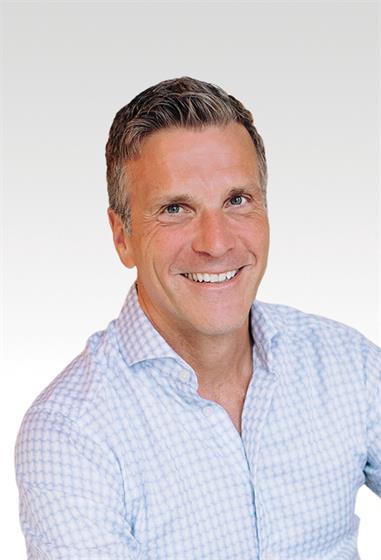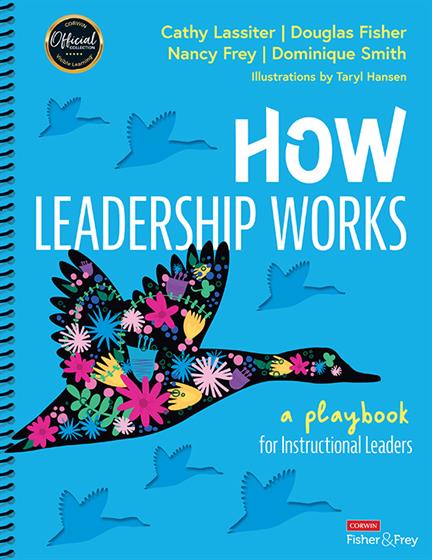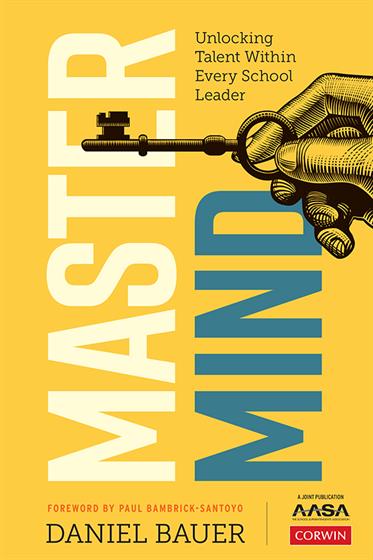Series 3 Leaders Coaching Leaders Podcast
[00:00:00.41] ANNOUNCER: Welcome to Corwin's Leaders Coaching Leaders
podcast with host Peter Dewitt. This podcast is from education leaders, for
education leaders. Every week, Peter and our guests get together to share
ideas, put research into practice, and ensure every student is learning not by
chance, but by design.
[00:00:19.13] PETER DEWITT: Hey, Tanya. Good to see you.
[00:00:21.32] TANYA GHANS: Hey, Peter. Good to see you too.
[00:00:25.08] PETER DEWITT: Boy, this is-- I do enjoy the podcast and I feel
like I see this every time then we're going to introduce your podcast about how
excited I am about the conversation. But I'm an education geek. And I really
like talking about education.
[00:00:39.35] And just having the opportunity to talk to Nancy Frey and
Cathy Lassiter is really great because not only do they bring in a very heavy
research background, but they also bring in-- Cathy's a former school leader.
So you have the leadership background and just a lot of experience between the
two. And this conversation about credibility to me is just such a very
important one.
[00:01:01.61] TANYA GHANS: Yeah. They really embody the idea of research to
practice. And so what listeners are, I think, really going to love is how they
distill this really heavy topic into four, I guess, plus one categories of what
really creates and makes leader credibility. So let's just turn it over to the
listeners as soon as we can because I think they're going to be excited to walk
away with this and learn quite a bit.
[00:01:32.06] PETER DEWITT: Exactly.
[00:01:33.23] TANYA GHANS: OK, happy listening.
[00:01:38.73] PETER DEWITT: Welcome to Leaders Coaching Leaders podcast.
[00:01:43.59] CATHY LASSITER: Thank you so much for having us.
[00:01:45.97] NANCY FREY: Peter, thank you so much. We really appreciate it.
[00:01:48.71] PETER DEWITT: Yeah, it's always good to see both of you. So
very excited to talk about this topic because as we've been going through
season three-- this is season three of the podcast-- one of the things that
actually has come up quite a bit is that of leadership credibility. So it's
really interesting to have that and then be able to talk to the two of you.
[00:02:10.88] So one of the other things we're trying to do on the podcast
is to really begin by just developing a common language and a common
understanding because we know we use a lot of words in schools, but we don't
have a common understanding always of what those words are. I would say
credibility would be one of those. So, Nancy, I can I start with you. When it
comes to credibility, what does that-- what does credibility mean when we're
thinking about leaders?
[00:02:41.95] NANCY FREY: Credibility actually has a really long research
base behind it, even though we as-- in our everyday speech often use
credibility to mean a number of different things. According to the research it
actually stems from four very distinct and detailed perceptions of the learner.
[00:03:05.28] So I guess that's the first part. We don't get to decide that
we are credible. These are all about perceptions of our learners. And so the
idea of teacher credibility, in particular, has been really well researched.
And there are four dimensions to that teacher credibility that come from that.
[00:03:24.77] The first is trustworthiness. Can I trust this person to be
able to have my best interest at heart, to be honest, reliable, and so on. The
second dimension of that is, do I believe that this person is competent to be
able to teach what it is that they are teaching? I think all of us have had
experiences where we enjoyed someone's company, but we didn't necessarily
believe that they possessed the knowledge base for a particular skill or
concept.
[00:03:55.91] The third aspect of that is dynamism. That's the passion, the interest
that you bring to what it is that you do. Does this person seem enthusiastic
about what it is that they are doing? And the fourth dimension to that is
immediacy. Do I see this person as being responsive to my needs, to the needs
of others?
[00:04:21.92] And it often boils down to many nonverbal kinds of signs of
immediacy, including things like eye contact and proximity and so on. So in
short, what we're talking about when we talk about credibility has 40 years of
research that are behind it. And it's trustworthy, competence, it is dynamism,
and immediacy.
[00:04:47.27] PETER DEWITT: Well, thank you for that. That is actually
probably the most clear-- when I ask for common language and common
understanding, that's probably the most clear anybody has ever been. So I
appreciate that. Cathy, you have a lot of experience as a school leader. And,
yes, you're a consultant, but you're an award winning school leader as well.
[00:05:10.29] And when I think about these ideas of the four detailed which
Nancy just talked about, how does that translate for leadership practices?
Like, not just what they should be looking for when it comes to teachers, but
also about what they should be looking for within themselves too.
[00:05:28.34] CATHY LASSITER: Yeah. So one of the things that separates
credibility from leaders, from teachers is leaders who are forward thinking.
And so in addition to those four qualities that Nancy gave you and articulated
so clearly as you noted, is that that idea of being forward thinking in Kouzes
and Posner's research-- which many leaders are very familiar with-- said that
really what separates in the eyes of the workforce-- what I admire in a
colleague and what I admire in a leader-- is that they expect leaders to be
forward thinking.
[00:06:06.38] And they don't really list that as an admired trait in a
colleague, but it comes up with 72% of-- Kouzes and Posner's research has tens
of thousands of respondents and that idea of being forward thinking. So your
question was what does that look like for a principal and a leader in a school?
[00:06:27.24] So we have to have the qualities on display that Nancy just
listed, the dynamism, the competence, the trustworthiness, the relatedness. But
we also have to always be communicating to our people where we're going, why
we're going there, what do we hope to accomplish by getting there, how will you
participate in this future for our organization and our school.
[00:07:00.29] So you can't do that without being trustworthy, without being
a dynamic person. And that doesn't mean like an entertainer, it means being
passionate and really connected to the work. You can't do that without
competence because you've got to know your craft and know how to lead change
and know how to lead people and know how to support people.
[00:07:23.54] And, certainly, people have to be able to come and talk about
their hopes, their dreams, about their concerns, their challenges. And so I
think it's that forward-looking piece that we're trying to get to by
demonstrating the four qualities that Nancy just talked about.
[00:07:41.32] PETER DEWITT: And it reminds me a little bit of Stone in
Haynes work when-- thanks for the feedback from 2014-- where one of the
probably most impactful things that I had read in that book was the whole idea
of the relationship trigger. And it's not that your feed-- when you're
receiving feedback and that relationship trigger goes off, it's not that you
don't believe it or you find it to be unhelpful, it's like you don't believe in
the credibility of the person who's actually giving you the feedback.
[00:08:13.23] So we know that this is huge when we talk about learning walks
and walkthroughs and observations and everything else. So that's-- it's really
interesting. I want to ask you, Nancy, one of the questions that I get a lot is
it's like the space around the word support because I find that that's another
word that we have the common word, but we don't have a common understanding.
Because-- and even the Adweek Research Center has done some work around this.
[00:08:39.93] Like, 86% of principals completely support teachers when
they're trying to be innovative. But 46% of teachers completely agree their
principal supports them when they're trying to be innovative. So where does
support play into all of this when it comes to building that credibility?
[00:08:57.21] Because I hear a lot of teachers saying, I don't feel like my
school leader supports me. And I feel like there's a lot of research that says
an important aspect for school leadership is to actually support their
teachers. And leaders feel like they're doing that, but I feel like there's
this gap. So where does credibility play into that? Is that a good question?
[00:09:17.00] NANCY FREY: Yeah, absolutely, absolutely. And I think that,
first and foremost, the idea of trustworthiness really kind of permeates the
other dimensions around credibility. But what you're speaking to, Peter, I
think in particular is that notion of competence. That support when it comes to
how it is that a school leader supports a teacher, supports a staff member in
being able to think innovatively really comes down to competence.
[00:09:48.27] And, again, if you tease apart the research on competence and
perceptions of competence of leaders, it breaks down into two specific areas.
One is around communication competence. Is this person able to communicate in
ways that I understand, that I can see in order to be able to deliver that kind
of support? Here's where feedback really plays into all of that.
[00:10:19.29] Sometimes we have well-intended feedback that doesn't land. It
doesn't land at all. So that oral communication skills in particular is a
really important part of that support. Some interesting research that came out
around what it is that principals do in particular when it comes to that. And
their findings were that 70% of the principals' time was dedicated to oral
communication competence of one kind or another.
[00:10:54.90] We talk about how important it is that we're able to be able
to walk the talk, but we also have to be able to talk the walk, in other words
to explain it. And the other dimension of that is skill competence. Again, do I
believe that this person's support and feedback and so on is coming from a
source that I believe to be credible?
[00:11:20.61] And principals, I think, secondary principals especially are
kind of challenged at times with this idea of skill competence because they may
narrowly think about skill competence as being something that is related to the
teacher's content. And, oh, I don't teach that content. I'm an English teacher by
training, I don't know how to support a math teacher, for instance.
[00:11:44.16] And that skill competence, especially when it comes to
principals, is how it is that you know how to be able to create resources. How
it is that you are sensitive to what that teacher needs. How it is that you're
sensitive in being able to mobilize what those supports are needed for that
teacher. So this idea of competence, especially communication competence and
skill competence, is vital in being able to support and support well.
[00:12:11.85] PETER DEWITT: And that's an excellent point because I feel
like credibility can also be built because when you're-- specifically when
you're talking about secondary is that I'm not going to understand all of the
content.
[00:12:24.63] But if I have that pre-observation conversation with the
teacher to be able to say what is your success criteria, what is some
vocabulary that you're hoping the students are going to be able to say to me
when I'm sitting down talking with them about they're learning. And not, like,
I hate the whole notion of fake it till you make it. And I know that you both
don't like that either so I appreciate that very much.
[00:12:47.15] Cathy, one of the things that you said was the whole idea of
being forward thinking. And one of the things we hear about quite a bit is that
idea of buy-in. And I think sometimes when people hear that they're forward
thinking, especially school leaders, it's this pressure that I'm supposed to be
the all-knowing, I'm supposed to be the one that has all the ideas.
[00:13:06.35] And I know that that's not at all what you meant when you said
forward thinking and going with me and all that stuff because you do a great
deal of work on collaboration. So what is it-- what does it look like for
school leaders to intentionally build that credibility with their teams?
Because it's not about going it alone and having people follow, it's about
people with you. So how do you leaders intentionally build that credibility
with their teams to be able to do that forward thinking work?
[00:13:35.95] CATHY LASSITER: Yeah. So really interesting research on this
as well. Nancy and I are just coming off with Doug Reeves and Dominique Smith
doing a lot of research on this topic. So we have it all on the top of our
heads. [LAUGHS]
[00:13:48.58] PETER DEWITT: And I got you had a good time.
[00:13:50.11] CATHY LASSITER: Yeah. But it is being forward thinking by
being grounded in the present. And so what the researchers talk about is really
principles. And as you said, I'm in schools every day almost with principles.
[00:14:09.23] But principles setting aside dedicated time to be learners
because you can't be forward thinking if you don't know about current trends,
current practices, current challenges, policies and regs and all of those
things that are coming at principles that they typically don't set aside time
to do because they're putting out fires all day long.
[00:14:32.58] In fact, the research said that executives, business
executives only set aside 3% of their time to engage in this kind of work. And
my guess would be-- because my opinion is school principals-- are busier than
any other people, so they probably have less than 3%.
[00:14:51.29] But that is super important to set aside dedicated time for my
professional reading, for listening to podcast, for attending webinars, for
reading professional journals, for participation in my professional
organizations so that I can really be grounded in what's current in the field.
And then, as you said, to not be the all-knowing visionary because that's
impossible to share what I'm learning with my leadership team and with my
staff. And then, more importantly, to model what that should look like for
them.
[00:15:29.04] So we have leadership team meetings. Ultimately what we're
recommending is that part of those agendas be dedicated to learning something
new. And it's not just the principal bringing that new learning to the table.
It's everybody taking a turn, everybody getting excited about something that they've
read. And then talking together about the relevancy for us.
[00:15:53.37] What does that mean for us as a school? What does it mean for
where we want to go? What do we want to be known for in our community? What
kind of experience do we want our students to have at our school? And how can
we leverage this new information and new ideas and research to help us plot a
forward thinking journey so that we can be on the cutting edge?
[00:16:19.07] PETER DEWITT: That's great. Now, Nancy, I know that-- is this
what Cathy just said-- I know that you, Cathy, Dominique, and Doug Fisher are
writing this book together. Now, is this where self-efficacy kind of comes into
play too? Because we know Bender's research around leadership self-efficacy is
that if you lack self-efficacy in that area, you're going to slack in your
efforts. And if you have self-efficacy, an issue, you're going to double your
efforts.
[00:16:45.71] So is the work you're trying to do, Nancy, through this book
too is to help leaders understand, you know what? It's OK if you're not
efficacious where this is concerned. That's why having a team is so important
because you're supposed to be learning together. I'm guessing I'm asking you a
question that we know the answer to, but is that also where you're focusing on
with this book that you're doing with--
[00:17:07.47] NANCY FREY: Yeah, yeah, absolutely. And the idea of feeling
efficacious as a leader is it can be especially difficult. Among the issues
that we discuss in the book include things like having leaders, new leaders,
especially, who find themselves in positions that they're unaccustomed to.
[00:17:30.92] So, for example, when we talk about leaders, we talk about
people who are leaders of teams, of units, as well as of schools. And we talk
in particular about what are some of the challenges when you are internally
promoted? That you're moving from one position to another position within a
particular school.
[00:17:51.80] There are some distinct challenges that are involved with
that, including the perceptions of others. We talk about-- as another example
of that, when you're a new principal, when you're new to a site, when you're
succeeding-- succeeding, rather, principal. Especially that beloved principal
that everybody just adored. How do you build trust among a new staff when
you're the new person who's coming in?
[00:18:21.14] So those ideas of how it is that you're building your own
efficacy not only for yourself, but also building a perception of who it is
that you are are vitally important for those new leaders, especially. And
you're exactly right, you have to have a network, you have to take advantage of
that network around you, whether that network is right there at the school
level or that network is across the district.
[00:18:47.93] PETER DEWITT: You just mentioned-- Nancy, you gave me a little
bit of a show because you just mentioned my exact situation when I became a
principal. I took over for a beloved principal. I was lucky he interview in
front of the panel of 17. That most of the teachers were on the panel they
wanted me to be there, but it is-- it's very intimidating to take over for a
very good act.
[00:19:09.20] Cathy, I want to talk to you a little bit about the
credibility thing because I just think there are so many ways we can go with
this discussion. Do you work with-- let me ask you a different way. What do you
do with teachers that say that their principal feels like they have this
instant credibility when they really don't?
[00:19:30.77] Because I think somehow credibility and status, sort of,
intersect every once in a while. And that can be very deadly for a school
leader. But what do you do in that kind of situation in the work that you're
doing? And, of course, with the book, what do you do when you've got teachers
that are saying, my principal thinks they're credible but they're not.
[00:19:50.59] CATHY LASSITER: Yeah, yeah. And so we in the book, talk about
this idea of real reflection that is relevant, it's timely. But most
importantly, it's learning focused. And so I recommend to principals that you
develop-- I always call it a tough skin. You have to have a tough skin as a
principal to be a learner about your own work. Learning about your leadership.
Learning on how people perceive you. Seeking the feedback that-- and there's
many different ways to seek feedback.
[00:20:26.54] Yes, you could do surveys and that kind of thing, but getting
a mentor or a retired principal to come in and sit and work with you or
consultant like I do with people. Because you can see in the interactions
between principals and staff what the tone and tenor is. And if the teachers
are responding to the principal as if he or she is credible. And how they are
responding if they don't find that person credible.
[00:20:57.59] And it goes back to Nancy-- the qualities that Nancy talked
about. Are they willing to share what's on their mind in a professional way
because there's a culture of trust and mutual sharing and respect? Or do they
just say, OK. And secondary people are famous for that, OK, whatever you say.
Just walk away. And is there-- do they seek advice from the principal.
[00:21:22.79] Like, I know I can go into my principal's office and ask them
a question about instruction and get some pretty good advice because they know
instruction. They know research. They know-- and they may not know everything
but as a teacher, I have a trust and confidence in my leader that they know how
to teach. And that I can learn something from them.
[00:21:44.18] And so it's important for the principal if they don't have,
first of all, the self-efficacy that you talked about. If I'm not confident
that I can lead in instruction, that they take steps to learn how to do it.
That they have an open mind and are learning-- seek to learn about their own
effectiveness as opposed to trying to hide from it. And to be transparent.
There's some things I know, some things I don't know. And I'm going to learn
what I don't know.
[00:22:11.81] PETER DEWITT: It sounds like it's OK too that if you have this
principal to give them a gift of your book and just say, hey, I thought you
might want to read this, right? Maybe that's a good-- you can be a little
passive aggressive. Just, hey, I thought of this-- I bought this book and I
thought of you, so here you go.
[00:22:28.79] As we wrap up the podcast, I want-- what is one practical
piece of advice that each of you can give listeners, whether they're teachers
or leaders, what is a piece of practical advice you can give them when it comes
to credibility? Nancy, can we start with you? I know you've offered-- I mean,
you've all offered so much already. And even if you have to reiterate something
that you did say, like, what's the one practical takeaway that they can have
when it comes to credibility, that they can do today?
[00:23:03.81] NANCY FREY: I think that my advice would be, especially for
those who have been in a particular leadership role for a while, is to not rest
on your laurels. In other words, as you interrogate your credibility to not
just consider things that you have done over the past two years, for example, but
what have you done in the last 30 days.
[00:23:28.25] In other words, that there's an evergreen renewal to being
able to invest in one's trustworthiness and competence and so on. And that it
needs to occur on a regular basis. It's not sufficient that you did something
wonderful seven months ago. What have you done in the last 30 days?
[00:23:48.29] PETER DEWITT: I love that. Five years ago I was really good,
but now-- sorry, I appreciate that. Cathy--
[00:23:54.97] NANCY FREY: You should've seen me.
[00:23:57.10] PETER DEWITT: Yes, you were there.
[00:24:01.58] CATHY LASSITER: So I would say that no matter what leadership
position a person is in, that you seek to understand the people that you work
with. Resistance is not always-- it's not personal. There's a route to
resistance. And if there's-- is it understanding? Is it not? I don't know how.
I don't know why we're doing this. I don't know where I fit in. But always
seeking to understand the people that you work with and then empathizing with
them whatever the human condition is.
[00:24:36.71] I mean, we're just still involved but still coming off of a
pandemic. People are traumatized. Kids, teachers, principals, I mean everybody.
And all that grace that we extended during the pandemic seems to have been
forgotten. And I think we need to bring it back.
[00:24:56.07] And we need to really work hard to see if we're thinking about
new ideas, the first questions we need to ask is how will this impact our
people? And will it impact some more than others? And what do we need to do to
support? And what do we need to do to teach? And what do we need to do to seek
feedback so that we can understand the human condition and all of this work and
go slow to go fast.
[00:25:22.20] PETER DEWITT: Well, thank you both Nancy Frey Cathy Lassiter.
I mean, not only was this a research-based conversation, but it was a very
practical one and everything in between. So thank you for being a part of the
Leaders Coaching Leaders podcast.
[00:25:38.92] CATHY LASSITER: Of course, thank you for having us.
[00:25:41.24] NANCY FREY: Peter, thanks for this opportunity. Much
appreciated. And, Cathy, just wonderful to be able to talk with you again about
leaders and about leader credibility.
[00:25:50.84] CATHY LASSITER: Same here, Nancy.
[00:25:57.09] TANYA GHANS: What a great session on leader credibility. A
bunch of things come to mind. And I know you will have something to share, we
might overlap. But the word that really stood out to me among the many was
interrogate. It may not be one of the core traits that they mentioned in there,
but I saw that thread in this idea of, if you're going to be a credible leader,
you've got to interrogate content.
[00:26:23.41] You've got to interrogate what people say. You've got to
interrogate what people do. Like, you have to be open and curious because you
have to learn in order to gain that competent that's so essential to
credibility. So I really just-- that was a standout for me, again, among many
things.
[00:26:42.66] PETER DEWITT: Yeah, my connection is I always go into a
session, whether it's a podcast, whether it's running a workshop, whether it's
writing whatever, and I did it as a school leader, as a learner. And sometimes
I feel like I was just very fortunate to have that opportunity to go in as a
learner, that I didn't feel like I-- I didn't get that pressure from the
superintendent to go in and hammer.
[00:27:05.23] I could go in and be a learner and understand my entry point.
And that speaks to so much to what Nancy has always talked about and Cathy
talks about as well. And one of the things that I really appreciate about Nancy
is that when I asked for common language and common understanding around
credibility--
[00:27:22.51] TANYA GHANS: You get it.
[00:27:25.41] PETER DEWITT: She gave me what I needed.
[00:27:27.30] TANYA GHANS: Yeah, yes. And that's why their work is so good
and so powerful. And just what a salve for leaders who just need some more
guidance than we, frankly, offer them so often about how to do this work and how
to do this work well. It's such a complicated and nuanced job so having heroes
like this in the field who are doing this work is really important.
[00:27:54.03] PETER DEWITT: Yeah, definitely. It was just such a-- I know
off air what I said to Nancy and Cathy and you is that I felt like I had to
strap on my seat belt for this one because it was just-- it went so fast.
[00:28:05.40] TANYA GHANS: It did.
[00:28:06.10] PETER DEWITT: Conversation just went so fast and flowed so
well. So I just want to thank you. Always good to see you. But I want to thank
all the listeners as well because this is who we're doing the work for. So
these podcasts and a discussion like this is just one of those Jim Knight
refers to life giving. It's one of those giving conversations that you walk
away with. So thank you for listening. And always good to see you, Tanya.
[00:28:31.14] TANYA GHANS: Always happy to learn with you and the guests.
So, again, until we meet next time. Have a great day, Peter.
[00:28:38.50] PETER DEWITT: You too.
[00:28:39.55] TANYA GHANS: Bye bye.









